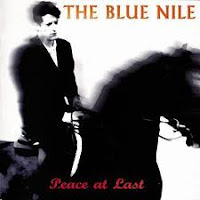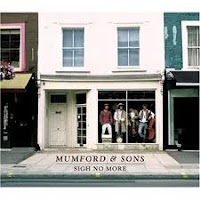 It's become almost a tradition now to go out and buy a pile of new pop cds to keep us company on the long drive to our holiday destination. This year I spent three days on (very) small roads on my way to pick up Ann in the Alps and together we added another day crossing France East to West. Later we pushed on to Asturias in Spain. And then there was the long trip back north. It's refreshing to travel slowly, avoiding the numbing monotony of the motorway.
It's become almost a tradition now to go out and buy a pile of new pop cds to keep us company on the long drive to our holiday destination. This year I spent three days on (very) small roads on my way to pick up Ann in the Alps and together we added another day crossing France East to West. Later we pushed on to Asturias in Spain. And then there was the long trip back north. It's refreshing to travel slowly, avoiding the numbing monotony of the motorway.  The musical harvest was pretty good, with three outstanding albums that have seen a lot of rotation in the last few weeks. All three are by bands I hadn't heard before.
The musical harvest was pretty good, with three outstanding albums that have seen a lot of rotation in the last few weeks. All three are by bands I hadn't heard before. The Maccabees are a British indie rock band that has been around for a while. Their first album was released in 2007 (Colour It). Given to the Wild is their third and most recent production (2012). It's a fast-paced and breezy album that grasps back to 1970s alternative rock and 80s Britpop tunes. The close harmony choruses that feature in many songs remind me of the Moody Blues' distinctive sound. Altogether a very entertaining collection, ideal for long stretches on the road.
The Maccabees are a British indie rock band that has been around for a while. Their first album was released in 2007 (Colour It). Given to the Wild is their third and most recent production (2012). It's a fast-paced and breezy album that grasps back to 1970s alternative rock and 80s Britpop tunes. The close harmony choruses that feature in many songs remind me of the Moody Blues' distinctive sound. Altogether a very entertaining collection, ideal for long stretches on the road. Roscoe's Cracks was a surprise. A moody and sophisticated debut recording by a Belgian, nay Wallonian band. The quintet hails from Liège. After the first few auditions I was enthralled. Now, after having heard it many times my judgment is slightly more reserved, if only because it strikes me that the album suffers from a certain monotony. Maybe I just need to put it aside for a while as there is no doubt that this is a most promising debut. The sound is quite distinctive, with a solid folkrock backbone that spills over in the expansiveness of Sigur Ros, and occasionally hints of the earlier, classic Radiohead. The songs have substance and depth. The production is positively luxurious, with several tracks featuring added strings and exotic instruments such as mandoline and Indian harmonium. The whole thing flows seamlessly. The CD is excellently recorded to boot.
Roscoe's Cracks was a surprise. A moody and sophisticated debut recording by a Belgian, nay Wallonian band. The quintet hails from Liège. After the first few auditions I was enthralled. Now, after having heard it many times my judgment is slightly more reserved, if only because it strikes me that the album suffers from a certain monotony. Maybe I just need to put it aside for a while as there is no doubt that this is a most promising debut. The sound is quite distinctive, with a solid folkrock backbone that spills over in the expansiveness of Sigur Ros, and occasionally hints of the earlier, classic Radiohead. The songs have substance and depth. The production is positively luxurious, with several tracks featuring added strings and exotic instruments such as mandoline and Indian harmonium. The whole thing flows seamlessly. The CD is excellently recorded to boot. The third revelation was An Awesome Wave, another debut by a Leeds-based alternative indie band with the enigmatic name Alt-J. This is likely the album that has been listened to most often over the past weeks as it found favour with all members of the family. The music is very difficult to pigeonhole. It reminds me somewhat of the sultry sparseness of The XX and the androgynous eroticism of the Wild Beasts. But it surpasses both in terms of its waywardness, imagination and poetic precision (the origami-like folded holder for the cd aptly captures that spirit). At first hearing the album presents itself misleadingly innocuous. But after hearing it again and again its wonderful layeredness unfolds. Our favourite track no doubt is the very last one - Taro - which is in fact a moving threnody for war photographer Robert Capa.
The third revelation was An Awesome Wave, another debut by a Leeds-based alternative indie band with the enigmatic name Alt-J. This is likely the album that has been listened to most often over the past weeks as it found favour with all members of the family. The music is very difficult to pigeonhole. It reminds me somewhat of the sultry sparseness of The XX and the androgynous eroticism of the Wild Beasts. But it surpasses both in terms of its waywardness, imagination and poetic precision (the origami-like folded holder for the cd aptly captures that spirit). At first hearing the album presents itself misleadingly innocuous. But after hearing it again and again its wonderful layeredness unfolds. Our favourite track no doubt is the very last one - Taro - which is in fact a moving threnody for war photographer Robert Capa. The other albums varied from the palatable to the merely dull. Moby's Last Night is a 2008 album that captures the mood of a Manhattan night of clubbing. So predictably it's rather dance oriented, with a trademark quiet finale. All the vocals are done by female guest singers which sets it apart in the burgeoning output of the Moby-factory. There are a few good tracks but as a whole the album does not come close to his best work. However, it's prettly listenable, which is more than I can say of his most recent release, Destroyed. I only listened to it once but found it impossibly trite.
The other albums varied from the palatable to the merely dull. Moby's Last Night is a 2008 album that captures the mood of a Manhattan night of clubbing. So predictably it's rather dance oriented, with a trademark quiet finale. All the vocals are done by female guest singers which sets it apart in the burgeoning output of the Moby-factory. There are a few good tracks but as a whole the album does not come close to his best work. However, it's prettly listenable, which is more than I can say of his most recent release, Destroyed. I only listened to it once but found it impossibly trite.Radiohead's King of Limbs seems to be a transition project. Are they genuinely exploring new artistic avenues or are they merely trying too hard to be smart and artsy ? This 35 minute, acerbic spiel of obsessive rhythms and delirious vocals didn't really capture my imagination. We'll have to wait for the next Radiohead installment.
 Band of Horses' Cease to Begin is an ok folkrock album that stays demurely within the stylistic conventions of the genre. Again, not a highflyer.
Band of Horses' Cease to Begin is an ok folkrock album that stays demurely within the stylistic conventions of the genre. Again, not a highflyer. DEUS' surprise release Following Sea continues the path taken since Pocket Revolution. There's really nothing to fault here. These guys are masters at their game. They can do anything. The songs in themselves are excellent, the lyrics are top (as always), the arrangements and mixing leave nothing to be desired. But the whole damn thing misses soul. Whilst the music reminds me in more than one way of their early work and the band worked hard to impart the album with a gritty urban feel, it doesn't capture the epic flow of an album like The Perfect Crash (which I must have listened to literally hundereds of times in my commuting days). Is DEUS going the same way as U2: a collection of stellar professionals who are perfectly capable of putting together a very polished but ultimately banal entertainment product?
DEUS' surprise release Following Sea continues the path taken since Pocket Revolution. There's really nothing to fault here. These guys are masters at their game. They can do anything. The songs in themselves are excellent, the lyrics are top (as always), the arrangements and mixing leave nothing to be desired. But the whole damn thing misses soul. Whilst the music reminds me in more than one way of their early work and the band worked hard to impart the album with a gritty urban feel, it doesn't capture the epic flow of an album like The Perfect Crash (which I must have listened to literally hundereds of times in my commuting days). Is DEUS going the same way as U2: a collection of stellar professionals who are perfectly capable of putting together a very polished but ultimately banal entertainment product? But all in all it was not a bad harvest. Meanwhile I've also purchased the fabulous Autumn Chorus CD The Valley to the Vale (previously only available via download). And now I'm looking forward to discovering the new Elbow, XX and Mumford and Sons albums, all recently released or due in the next few weeks.






























